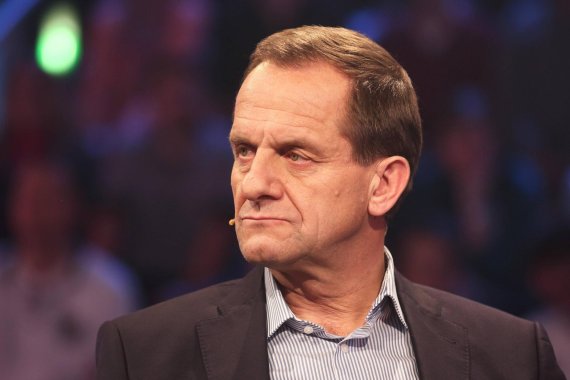
Alfons Hörmann speaks of the anger he initially experienced, of disappointment and incomprehension. The fact that the majority of people had dismissed his dream – the same dream held by countless sports officials, the industry and especially many athletes themselves; the fact that this latest failure of a German Olympic bid could really spell disaster for German sports: this still gnaws at the President of the German Olympic Sports Federation (DOSB) long after the withdrawal of Hamburg’s 2024 bid. Nevertheless, he was able to draw conclusions from this disaster just a few weeks later – a disaster that had serious repercussions for the sports business as well. The only correct conclusions.
No, Hörmann is not thinking about stepping down. He could have done so easily and simply vacated his office. Some would likely have even interpreted that as making a clean break, as a sign of an ungrateful electorate: Look, we recognized your desire for a different official. Defiantly, however, confidence in Hörmann was reiterated at a general meeting shortly after the Hamburg withdrawal.
Bid withdrawn for Hamburg Olympics: What role does Fifa play?
These functionaries, nearly all of the proponents of the German Olympic campaigns have taken the easy way out for some time now at least. The debates surrounding the Elbe Philharmonic Hall, the unrateable consequences of the issue of refugees, the scheming of world soccer association Fifa – this all amounts to a conglomerate of sideshows that serve as a splendid excuse for our own failures: Fitness and exercise have become a major trend here as well, but people are no longer able to get into sports the way things are currently organized by certain people – something the DOSB President has realized.
When you take a look at how most associations continue to work within last century’s infrastructure, you have no choice but to self-critically consider whether the current establishment, including this split between primary and honorary positions, is still appropriate. “Life teaches us that those who don’t go with the times end up a thing of the past,” said Hörmann at the SpoBiS sports business congress, referring to free enterprise where patriarchal structures have no place in companies in future.
Alfons Hörmann questions the support bases for the Olympics
Ten years after DOSB’s founding in 2006 as a merger between the National Olympic Committee and the German Sports Federation, the time has long been ripe for more than one self-critical voice of scrutiny. We need reforms, both structurally and in terms of personnel. Hörmann questions the support bases for the Olympics, a relic of the 1970s. He wants this interaction between politics (the Federal Ministry of the Interior, which is responsible for sports) and organizations to be restructured and makes no bones about the fact that it is a matter of changing minds – taking (literally) the old guard out of the game and allowing (probably younger) new generations to take up their mantle.
Consulting firm Ernst & Young will light the path for DOSB
“In many respects, we are no longer a world-class organization,” said Hörmann at SpoBiS, making clear that all of our current structures and people should be scrutinized through the “Anstoß 2016” (“Cheers to 2016”) project he hopes to use to promote long overdue reforms. But because self-regulation seldom comes from within, he has passed the process on to a neutral party: consulting firm Ernst & Young will carefully examine DOSM and its environment. This so-called task and efficiency assessment will proceed in a manner that is completely open-ended. That means leaving no stone unturned. As it should be.

Hörmann himself has not questioned the juxtaposition of the German Sports Aid Foundation (Stiftung Deutsche Sporthilfe), which many take a fully critical view of as an organization that is much too antiquated, and Deutsche Sportmarketing GmbH, which received a kind of organizational facelift in 2015 in the form of former basketball official Jan Pommer. The fact that he has essentially offered both institutions a guarantee beyond the existing agreements shows that even the DOSB President does not yet know what kind of monster he has created. If Ernst & Young is to take a truly impartial approach to “Anstoß 2016,” nothing can afford to be overlooked.
The failed Olympic bid has grave consequences
So what’s on the agenda? The current system, which still relies much too heavily on honorary structures, must be completely demystified. Professionals from all levels are needed – including those that are able to listen and anticipate the mood. The series of defeats faced by the German Olympic bids, from Berlin in 2000 to Hamburg in 2024, has had an even greater sociopolitical impact than the old guard – who allowed this to happen in the first place with their outdated modes of thinking – can afford to let continue.
Sports managers and the sporting goods industry must be integrated
Sports faces a permanent rivalry with other segments in the entertainment industry, and needs professionals from the business world to more strongly anchor its place in society: agile people of action from the sporting goods industry and managers brought forward through testimonials. Athletes themselves today are far more successful in marketing themselves and their own brands. Together with their industry partners, they often have enormous charisma and can advocate with a kind of credibility that has long since been gambled away by the functionaries still in place today.
The DOSM must arrive the digital age
The top executives behind the wheel of the sports system must think more modernly and appeal to the public, where the discussions are actually happening with their clientèle, for example, by engaging in the digital world. Only then will they achieve their aim of an open-minded public interested in sports. The way back to society need not necessarily be through a consulting firm – but the fact that they are obtaining outside opinions and third-party expertise is something that is needed to keep up with the times. Anger and ignorance make poor advisers. In office since 2013, Hörmann is late to the game but hopefully not too late – whether he is in favor of thorough changes or is only hoping for a transition is another question entirely.
 Sports BusinessSponsorship between fairness and image
Sports BusinessSponsorship between fairness and image Sports BusinessHow AI simulates your target group - and the benefits
Sports BusinessHow AI simulates your target group - and the benefits
- Awards
- Mountain sports
- Bike
- Fitness
- Health
- ISPO Munich
- Running
- Brands
- Sustainability
- Olympia
- OutDoor
- Promotion
- Sports Business
- Textrends
- Triathlon
- Water sports
- Winter sports
- eSports
- SportsTech
- OutDoor by ISPO
- Heroes
- Transformation
- Sport Fashion
- Urban Culture
- Challenges of a CEO
- Trade fairs
- Sports
- Find the Balance
- Product reviews
- Newsletter Exclusive Area
- Magazine



